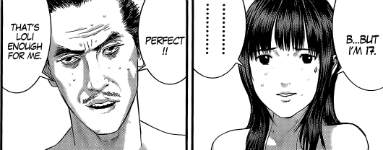Frankly, your gripe with the show comes off as a projection of your own pessimism rather than a critique of the show itself. Sure, real life doesn't "work that way", but seeking realism in supernatural shonen anime is ludicrous to begin with. Mob Psycho presents an optimistic possibility of human kindness; it does not take the kindness for granted nor does it assume that kindness is universally generalizable. In fact, Mob admits in episode 5 that not everyone is fortunate enough to live in a kind environment with positive influences, but that's precisely why he willingly chooses to be a positive influence himself. One's outlook on life boils down to matter of choice and mindset, while the potency of said outlook directly depends upon one's abilities and influence. Not all the villains changed for the better: Shimazaki escaped before any meaningful dialogue could be established; Ishiguro, Mutou, and Miyagawa from season 1 never appeared again; and Mogami didn't suddenly convert himself into a good spirit but rather maintained his vigilante attitudes. MP100 acknowledges the limitations of positive influence, but it chooses to give focus to instances where those influences were impactful instead.
Secondly, you're confusing moral development with societal responsibility. The fact that Suzuki changed for the better thanks to Mob does not take away from his crimes, which was why was ultimately captured by the foreign agent and subjected to laboratory experimentation. Likewise, the fact that Reigen helped and inspired Mob does not take away from his karmic downfall at the hands of Jodo and the media. Mob's positive influence grants others a peace of mind that does little to alter their actual circumstances. Being kind to someone at a personal level serves to alleviate future need for legal arbitration, but it does not undermine laws themselves.
Moreover, your understanding of psychopathy as a psychological construct is incorrect. Psychopaths lack empathy and an innate awareness of morality, but those attributes alone do not make them "evil". Although a large proportion of criminals are psychopaths, those criminals comprise a tiny percentage of all psychopaths within society. Many psychopaths managed to adapt to society by 'learning' the moral code via logical reasoning. On the other hand, though the anime touched little on Suzuki's backstory, he initially founded Claw as a peaceful organization to protect espers' human rights; Claw evolved into a terrorist organization after Suzuki's wife abandoned him, and after his organization was attacked by the government. At any rate, this demonstrated that Suzuki was capable of empathizing with others to an extent. Again, trait psychology as a field does not disprove Mob Psycho's message of human capacity for change. Some people are inevitably more difficult to change than others, while others require specific methods of persuasion to change. The fact that you or most people do not have the patience to facilitate that change in others does not take away from MP100's message. Likewise, your distaste of MP100's themes does not have to ground itself on logic.
How 'preachy" one finds MP100 to be is a completely a matter of subjective experience. However, most critics of MP100 fail to fully comprehend that MP100 is a character-driven story where the "plot" revolves principally around Mob's character development as opposed to physical conflicts. What you might consider repetitive of the narrative reflects subtle shifts in the way Mob himself interacts with others. In that sense, I consider the recurring dialogues absolutely essential to the story's progression.
On a final note, your frustration regarding Mob's fallacious ideology will be addressed by a final season of the anime if it ever comes. Otherwise, you're free to pick up the manga on ch91 where this season left off. |

